Leek syrup with honey, cold macerated, for bronchitis
Preparation time5 min
Waiting time14 days
Ready in14 days 5 m
Balm for respiratory ways: bronchitis, cough, hoarseness, tonsillitis, pharyngitis, laryngitis
Leek macerate with honey is a well-known remedy for bronchial diseases, treating both dry cough and sputum, sore throat such as hoarseness, pharyngitis, tonsillitis, laryngitis.
Servings: 5 servings
We will obtain ~ 100 ml of leek syrup with honey
Ingredients
Estimated cost: 1.0 €
Materials
- - glass container (jar), ideally not much larger in diameter than the diameter of the leek;
- - knife;
Preparation
 Wash the leek and peel dry leaves if exists.
Wash the leek and peel dry leaves if exists.
We will use only the white part, from the base (root) of the leek. We cut slices from the white part of the leek, of medium thickness (0.5mm - 0.8mm);
We cut slices from the white part of the leek, of medium thickness (0.5mm - 0.8mm); Place the leek slices in a jar, one on top of the other, until the jar is full.
Place the leek slices in a jar, one on top of the other, until the jar is full. Pour the honey lightly over the leek slices, so that it drains well between them and covers them completely.
Pour the honey lightly over the leek slices, so that it drains well between them and covers them completely. Close or seal the jar with a lid or cling film and an elastic band.
Close or seal the jar with a lid or cling film and an elastic band. The mixture is left to macerate for 7 days - 30 days, in cool, ventilated and protected from light.
The mixture is left to macerate for 7 days - 30 days, in cool, ventilated and protected from light.
Honey preserves leeks very well, even if it is not refrigerated, the mixture will not spoil.
Finally, the mixture will be filtered using a large mesh sieve or gauze. If the honey is not too liquid, then we can help ourselves with a bain-marie, to heat the mixture a little, but at temperatures not exceeding 40ºC.
If you have a vegetable press, you can use it to squeeze the leek slices that are full of honey. If not, after thoroughly filtering the mixture, you can add a little lukewarm water over the leek slices in the jar, shake vigorously and use the liquid.
Once the jar is opened, it is recommended to consume it as soon as possible.
Administration
→ For prevention or incipient bronchitis, 3-6 tablespoons a day is recommended. After administration, it is recommended not to drink or eat for at least 15 minutes (ideally half an hour);
→ For more serious conditions, it can be administered every hour or even half an hour, depending on the cough, irritation of the throat and bronchi.
→ The syrup can be taken with a spoon, teaspoon or even a small glass, one sip at a time.
→ In children the dose will be halved!
→ This syrup is not recommended for babies!
⚠ For more serious conditions, if after 3 days of administration you do not feel any improvement, be sure to consult a doctor!
→ For more serious conditions, it can be administered every hour or even half an hour, depending on the cough, irritation of the throat and bronchi.
→ The syrup can be taken with a spoon, teaspoon or even a small glass, one sip at a time.
→ In children the dose will be halved!
→ This syrup is not recommended for babies!
⚠ For more serious conditions, if after 3 days of administration you do not feel any improvement, be sure to consult a doctor!
Observations
⚠ Unlike onion syrup with honey obtained by maceration, macerated leek syrup with honey is obtained a little harder, maceration being much slower. I left the mixture to soak for 2 weeks.
→ The advantage of this syrup obtained by cold maceration, compared to leek syrup obtained by boiling, is that the properties of leek are not altered by the thermal process and are transferred directly to the honey. Instead, the maceration process takes longer until the syrup is ready and the shelf life is much shorter.
⚠ Validity and storage:
→ If you have made a smaller amount of syrup to be consumed in 48 hours, you can store the syrup at room temperature, away from light, hermetically sealed.
→ If you have made a larger amount of syrup, which cannot be consumed within 48 hours, then store it in the refrigerator, in glass containers, tightly closed. When stored in the refrigerator, if unopened, the syrup can be stored for up to 30 days.
→ It is recommended that the syrup be consumed as soon as possible after preparation (after filtration). Frequent contact with light and air alters the properties of the syrup.
→ Being kept in the fridge, the syrup is too cold to be consumed immediately and should somehow be allowed to warm to room temperature ... Therefore, after filtering, I recommend putting the syrup in the smallest possible bottles in the refrigerator and removing only one at room temperature, enough to last you for a maximum of 48 hours.
→ The advantage of this syrup obtained by cold maceration, compared to leek syrup obtained by boiling, is that the properties of leek are not altered by the thermal process and are transferred directly to the honey. Instead, the maceration process takes longer until the syrup is ready and the shelf life is much shorter.
⚠ Validity and storage:
→ If you have made a smaller amount of syrup to be consumed in 48 hours, you can store the syrup at room temperature, away from light, hermetically sealed.
→ If you have made a larger amount of syrup, which cannot be consumed within 48 hours, then store it in the refrigerator, in glass containers, tightly closed. When stored in the refrigerator, if unopened, the syrup can be stored for up to 30 days.
→ It is recommended that the syrup be consumed as soon as possible after preparation (after filtration). Frequent contact with light and air alters the properties of the syrup.
→ Being kept in the fridge, the syrup is too cold to be consumed immediately and should somehow be allowed to warm to room temperature ... Therefore, after filtering, I recommend putting the syrup in the smallest possible bottles in the refrigerator and removing only one at room temperature, enough to last you for a maximum of 48 hours.
Effects and benefits
Effects and properties:
- antibiotic;
- antiviral;
- antibacterial;
- immuno-stimulator;
- anti-allergic;
- antioxidant;
- anti-inflammatory;
- antiseptic
- laxative;
Supports the respiratory system:
- relieves bronchitis, inflammation of the gills and bronchioles;
- helps to relieve cough, soothes both dry and sputum cough;
- has calming and expectorant properties that help eliminate phlegm and heal irritation (it practically helps eliminate bacteria and clean the airways);
- also acts as an antibiotic that fights microorganisms;
- relieves sore throat: hoarseness, tracheitis, tonsillitis, pharyngitis, laryngitis;
Supports the cardiovascular system:
- protects the heart and blood vessels;
- indicated in hypertension;
- indicated in angina, atherosclerosis;
- lowers bad cholesterol (LDL);
Anti-rheumatic effects:
- reduces chronic inflammation;
- good in rheumatism, arthritis, gout: leeks promote the elimination of uric acid;
Supports the digestive system:
- has laxative effects;
- helps to calm the irritations of the digestive tract;
- helps eliminate worms and intestinal parasites (earthworms, pinworms);
- cleanses the colon, helps eliminate toxins;
- the ideal ally in the fight against constipation;
Supports the nervous system:
- increases alertness and concentration, being rich in magnesium, phosphorus and folic acid;
- improves memory;
- fights stress, good in dyspepsia, anemia;
Other:
- strengthens the immune system;
- treats inflammation of the urinary tract;
- good for kidney failure, kidney stones, urinary retention, cystitis;
- good for liver disease;
- together with acacia honey, it acts on insulin, increasing its hypoglycaemic effect;
- fight against obesity;
- good for allergies;
- fights oxidative stress, being a powerful antioxidant;
Side effects
- allergies for those allergic to honey or nickel;
Contraindications
- leek contain nickel, which is why they should be avoided by people with a nickel allergy;
- contraindicated for those allergic to honey;
- contraindicated for babies;
Another information
→ Leek isa close relative of onions and garlic and practically have similar properties and therapeutic effects, such as: supports the respiratory system (respiratory balm), protects the heart and blood vessels (lowers cholesterol, fights atherosclerosis), is anti-inflammatory, antioxidant , fights oxidative stress and prevents cancer.
→ Provitamin A contained by leeks helps protect cells that help prevent the risk of cancer.
→ Leek contain an important level of nitrogen and are a good builder and regenerator.
→ Leek is antiseptic, tonic.
→ Leek is recommended in a low-calorie diet.
→ Leek help lower bad cholesterol (LDL) in the blood.
→ Provitamin A contained by leeks helps protect cells that help prevent the risk of cancer.
→ Leek contain an important level of nitrogen and are a good builder and regenerator.
→ Leek is antiseptic, tonic.
→ Leek is recommended in a low-calorie diet.
→ Leek help lower bad cholesterol (LDL) in the blood.
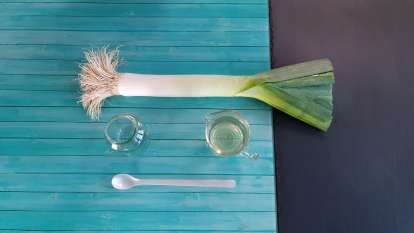
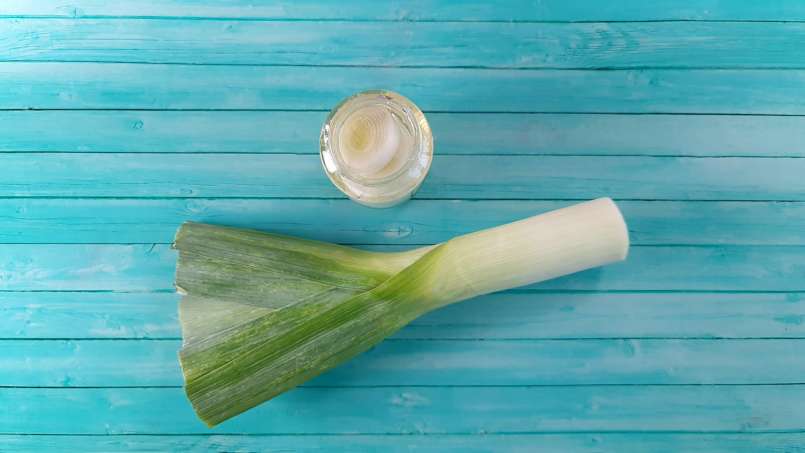
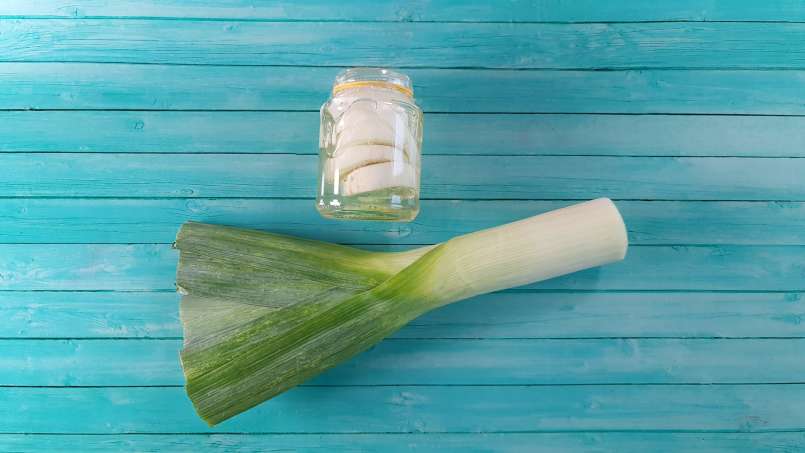
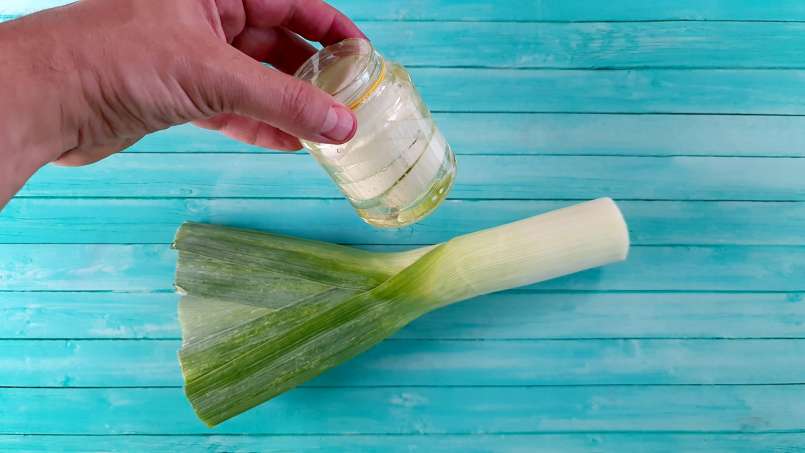
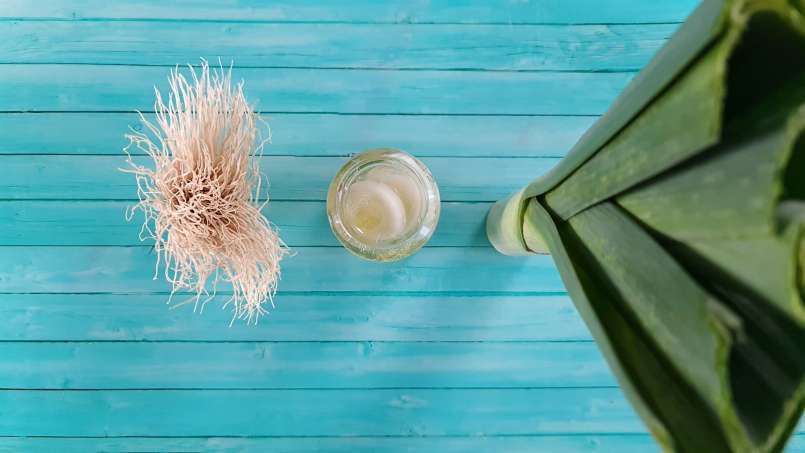
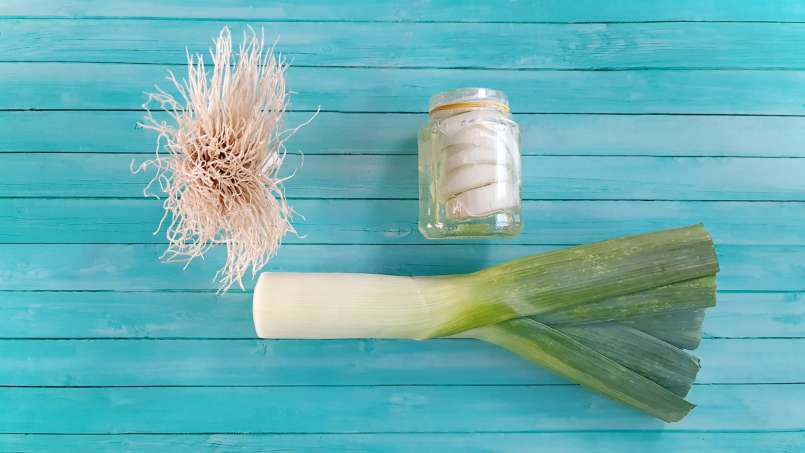
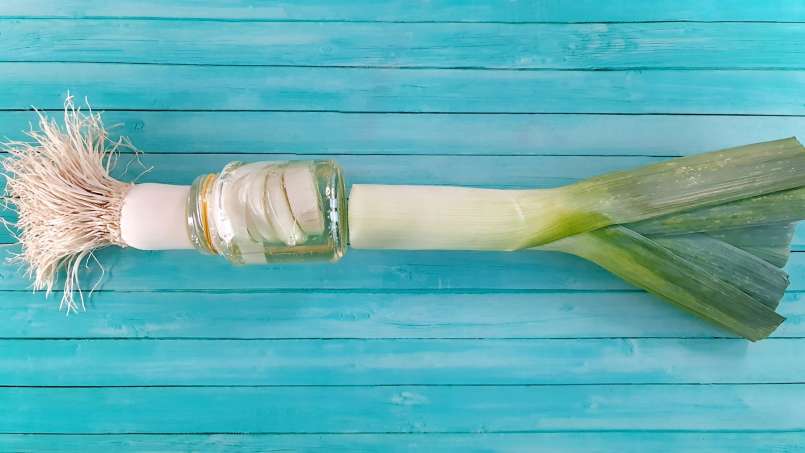
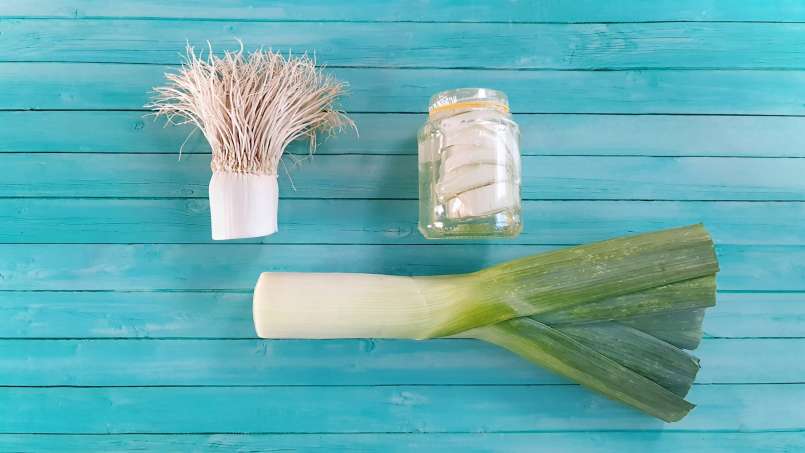
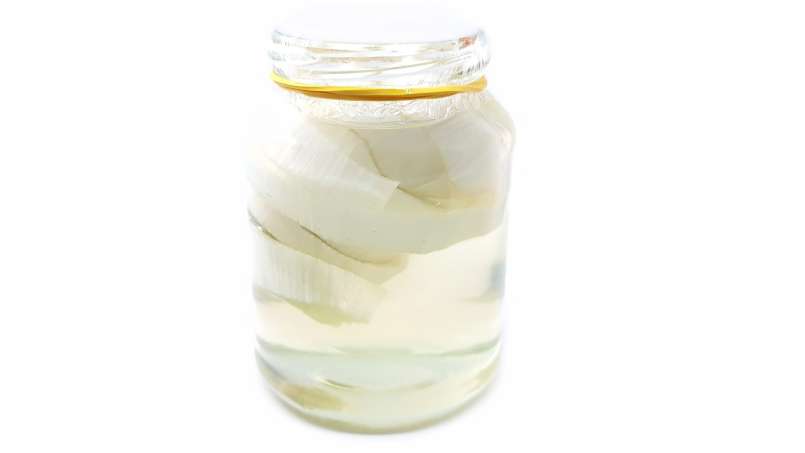
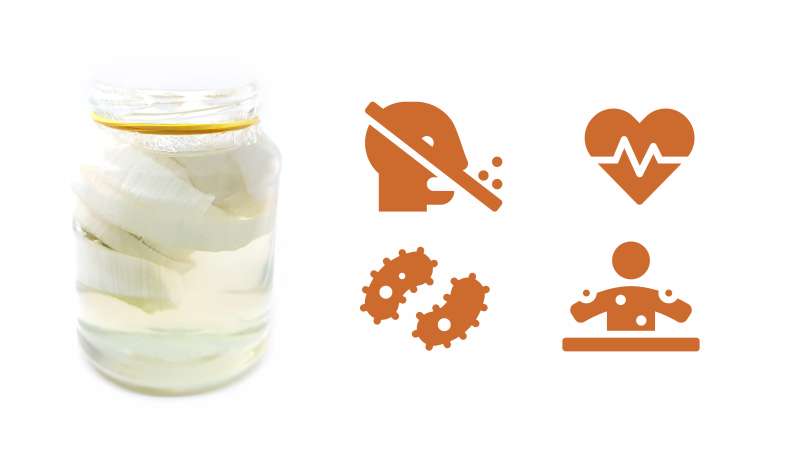
Comments